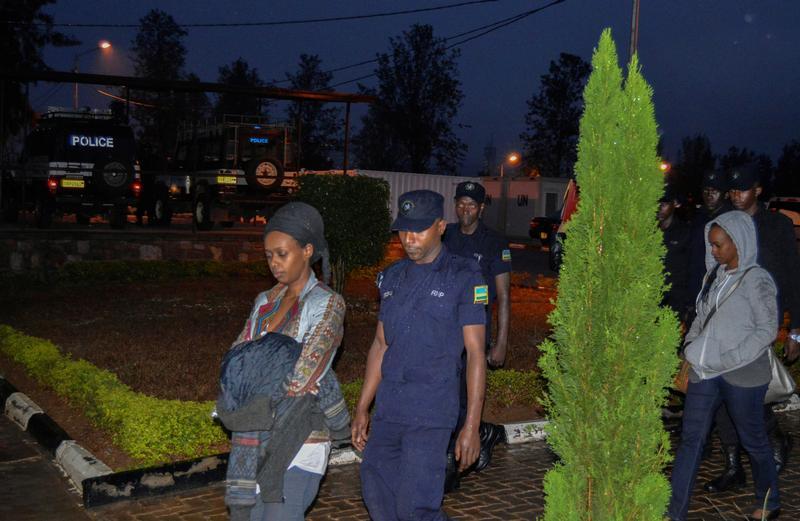
Rwandan authorities have arrested, forcibly disappeared, and threatened political opponents since the August 2017 presidential elections, Human Rights Watch said today. The incumbent, Paul Kagame, won the election with a reported 98.79 percent of the vote.
Those targeted include a would-be independent presidential candidate, Diane Rwigara, and her family members and supporters, and several leaders and members of the Forces démocratiques unifiées (FDU)-Inkingi opposition party.
“The Rwandan government’s crackdown shows that it is unwilling to tolerate criticism or accept a role for opposition parties, and it sends a chilling message to those who would dare challenge the status quo,” said Ida Sawyer, Central Africa director at Human Rights Watch. “With each arrest in Rwanda, fewer and fewer people will dare to speak out against state policy or abuse.”
Rwandan authorities took no chances with the August 4 presidential vote, despite the weak prospects for any opposition candidate. Several presidential aspirants were barred from participating. The only two allowed to enter the race and compete against Kagame, Frank Habineza and Philippe Mpayimana, said they experienced harassment, threats, and intimidation. In the days following the vote, Human Rights Watch interviewed local activists and private citizens who spoke of intimidation and irregularities in both the campaign period and during the voting.
On August 29, police showed up at Rwigara’s office in Kigali, the capital, and took her to her home, where they interrogated Rwigara and her family members and barred them from leaving their house. On August 30, following rumors that Rwigara may have been arrested or forcibly disappeared, the police announced that she was not in detention but that she was under investigation.
After several weeks of intimidation, questioning, and restrictions on their movements, Rwigara and her sister, Anne, a dual Rwandan and American citizen, and her mother, Adeline, a dual Rwandan and Belgian citizen, were arrested on September 23. They are being held in police custody in the capital, Kigali.
The police say that they arrested the three, in part, for “publicly revealing information that is, by law, supposed to be confidential.” During the interrogations in the weeks before her arrest, Rwigara told Human Rights Watch that she was being accused of forgery linked to alleged invalid signatures to establish her candidacy, of illegally forming and leading a political organization, and of inciting insurrection or trouble among the population. The family was also accused of non-payment of taxes.
In the days leading up to her arrest, Rwigara spoke with international media outlets and criticized the police actions and the accusations against her. Hours before her arrest, Rwigara told one outlet that her family was being “persecuted for criticizing the government.”
The harassment of Rwigara began in May, when – 72 hours after she announced her intention to run in the presidential election – nude photos of her were published on social media in an apparent attempt to humiliate and intimidate her. Rwigara said the photos were photoshopped. In July, the National Electoral Commission rejected her candidacy, claiming that many of the required signatures supporting her candidacy were invalid. Rwigara rejected the accusations and said she had fulfilled the eligibility requirements.
“This is all linked to my political activities,” Rwigara told Human Rights Watch on September 13. “They would not let me campaign freely, and now they are after me and my family.”
Since Rwigara has come under police investigation, some of her supporters have been arrested or harassed. On September 12, police arrested a supporter at his home, where they found t-shirts supporting Rwigara. He was held in an unknown location and questioned about Rwigara, then released five days later. Two of his family members were also arrested and one was released after being held in an unknown location for a week. The other remains in police custody.
Rwigara’s arrest comes amid growing pressure on other political opponents. On September 6, seven FDU-Inkingi members were arrested, including four of the party’s leaders: Boniface Twagirimana, first vice-president; Fabien Twagirayezu, head of party mobilization; Léonille Gasengayire, assistant treasurer; and Gratien Nsabiyaremye, assistant commissioner. Théophile Ntirutwa, Kigali representative of the party, went missing on September 6. Police arrested other FDU-Inkingi members in the following days.
The FDU-Inkingi has faced serious challenges since 2010. The party has not been allowed to register or take part in elections, and its members have been arrested and harassed repeatedly. The party’s president, Victoire Ingabire, has been in prison since 2010 and is serving a 15-year sentence following a flawed trial.
